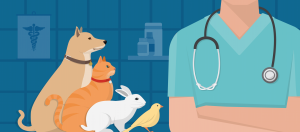 Do you know which organ is the largest one in the body? I’ll give you a hint: most people don’t think of me as an organ!
Do you know which organ is the largest one in the body? I’ll give you a hint: most people don’t think of me as an organ!
If you guessed the skin, give yourself a high five!
The skin is part of the integumentary system, the organ that provides the protective covering of a person or animal. For animals, this includes the skin, haircoat, scales, feathers, nails, horns, and hooves.
I do a lot more than just grow the beautiful fur coat that your pet wears around!
When I don’t feel well, I will show you the following signs:
Poor Nutrition
Make sure your pet is eating well and eating the right foods. A well-balanced diet is important to keep me healthy and growing a beautiful fur coat.
Parasites
Yuck! Regular flea, tick, and heartworm preventions are super important when it comes to keeping your pet and your family safe from parasites and the infections they carry.
Bacteria and Yeast
There are many organisms that call your pet’s skin home, but sometimes these normal inhabitants can go rogue and cause an infection.
Allergies
Environmental allergens like pollens and molds can affect me too! And just like people I can be allergic to certain foods.
Immune-Mediated Diseases
Problems in your pet’s immune system may show up as skin problems and your veterinarian may refer you to a specialist for these issues.
Systemic Disease
Your veterinarian may run blood work or other diagnostics to look for things like hypothyroidism or liver disease based on my appearance.
Cancer
Pets can develop certain cancers that involve the skin. Other times, certain problems with the skin can indicate that there may be an internal cancer.
Your pet’s veterinarian can identify skin lesions/sores and the patterns they form on your pet. A thorough exam helps the doctor determine the proper diagnostic procedures to perform, such as skin cytology, scrapes, and hair plucks. A look under the microscope of these will reveal any infections with bacteria, fungi, or parasites. Sometimes your veterinarian may need to run blood work, allergy testing, cultures or biopsy samples to determine what it wrong.
Concerned about your pet’s skin or overall health? Talk to your pet’s veterinarian or call Red Bank Veterinary Hospital at (732) 747-3636 for an appointment.